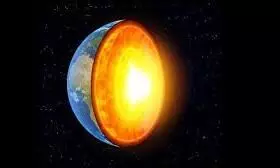
Earth's inner core is slowing down, changes began around 2010: study
text_fieldsThere has been a significant slowdown in the rotation of the Earth's inner core, confirmed the researchers from the University of Southern California (USC).
This discovery, reported by Science Alert, poses crucial questions about planetary mechanics and could impact both the Earth's magnetic field and the length of our days.
The study, published in the journal Nature, provides evidence that the inner core began to decelerate around 2010, marking the first such event in approximately 40 years. The inner core, a super-hot, super-dense sphere composed of iron and nickel, is located over 4,800 kilometers beneath the Earth's surface.
John Vidale and his colleagues at USC conducted the study by analyzing data from 121 repeating earthquakes recorded between 1991 and 2023 near the South Sandwich Islands in the South Atlantic. They also utilized seismic data from Soviet nuclear tests (1971-1974) and additional nuclear tests from France and the United States.
"When I first saw the seismograms that hinted at this change, I was puzzled," said Vidale, Dean's Professor of Earth Sciences at USC Dornsife College of Letters, Arts, and Sciences. "But when we found two dozen more observations indicating the same pattern, the result was undeniable. The inner core had slowed down for the first time in many decades. Other scientists have proposed similar and different models, but our latest study offers the most compelling evidence."
Vidale explained that the slowdown in the inner core's rotation is driven by the turbulent movement of the liquid outer core, which generates the Earth's magnetic field, and gravitational interactions with dense regions in the overlying rocky mantle. This deceleration could eventually influence the planet's overall rotation, potentially lengthening our days by fractions of a second.
"The impact is minuscule, altering the length of a day by about a thousandth of a second, almost imperceptible amid the noise of the churning oceans and atmosphere," Vidale noted.
Moving forward, the research team aims to map the inner core's trajectory in greater detail to better understand the reasons behind its shifting behavior. "The dance of the inner core might be even more dynamic than we currently know," Vidale added.























